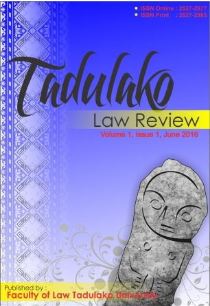LEGAL PROTECTION FOR CONSUMERS DUE TO THE FREE MARKETING OF DRUGS IN PALU CITY
Keywords:
Parking Attendant; Consumer; Consumer ProtectionAbstract
The rapid advancement of science and technology today has significantly influenced the development of medicines, as seen from the emergence of various types of drugs freely circulating in the market. The Health Law grants the government authority to supervise matters related to public health, providing a foundation for regulating the supervision of drug production, procurement, and proper manufacturing practices. The research questions posed are: What are the responsibilities of producers and pharmacies in freely marketing drugs to consumers? To what extent is legal protection available to consumers for the sale of drugs freely sold in pharmacies? This research aims to determine the responsibility of producers and pharmacies in the free sale of drugs and to assess the legal protection available to consumers who may be harmed by the sale of freely marketed drugs in pharmacies. This study employs empirical legal research, which is based on field observations and interviews with various stakeholders and relevant institutions. The Department of Health is responsible for the supervision and regulation of the standards and/or requirements related to safety, efficacy, and quality of pharmaceutical preparations, medical devices, and household health supplies. This supervision is supported by BPOM (The National Agency of Drug and Food Control), a non-ministerial institution that issues drug circulation permits. Pharmacies, as business entities that distribute drugs to the public, are responsible for ensuring the proper circulation permits for pharmaceutical preparations, medical devices, and household health supplies. Legal protection for consumers concerning the circulation of freely marketed drugs is regulated under the Health Law, which includes provisions on the security and supervision of pharmaceutical preparations. If violations occur, the drugs are withdrawn from circulation and destroyed by the business entity (pharmacy) as part of the repressive measures outlined in the Consumer Protection Law. Business entities are responsible for compensating any damage, pollution, and/or losses suffered by consumers due to the consumption of goods and/or services produced or traded, with dispute resolution available through both litigation and non-litigation means.
References
Book
A.Z. Nasution (1996), Konsumen dan Hukum, Penerbit Pustaka Sinar Harapan, Jakarta
C.S.T. Kansil (2009), Pengantar Ilmu Hukum dan Tata Hukum Indonesia, Balai Pustaka, Jakarta
Gunawan Widjaja dan Ahmad Yani (2001), Hukum Tentang Perlindungan Konsumen, Penerbit Gramedia Pustaka Utama, Jakarta
Philipus M. Hadjon (1987), Perlindungan Hukum Bagi Rakyat Indonesia, Bina Ilmu, Surabaya
Shidarta (2000), Hukum Perlindungan Hukum Indonesia, PT Grasindo, Jakarta
Statute/Law
Kitab Undang-Undang Hukum Perdata
Undang-Undang Nomor 8 tahun 1999
Undang-Undang Nomor 17 Tahun 2023 Tentang Kesehatan
Peraturan Presiden Republik Indonesia Nomor 80 Tahun 2017 Tentang Badan Pengawas Obat Dan Makanan
P Peraturan Badan Pengawas Obat dan Makanan Nomor 14 Tahun 2022 tentang Penarikan dan Pemusnahan Obat yang Tidak Memenuhi Standar dan/atau Persyaratan Keamanan, Khasiat, Mutu, dan Label
Peraturan Menteri Kesehatan Nomor 9 Tahun 2017 tentang Apotek
Peraturan Pemerintah Nomor 28 Tahun 2024 Tentang Pelaksanaan Undang-Undang Kesehatan
Journal
Alfan Muhammad Nur Zahaid, Bambang Eko Tresno, R. Suharto (2016), Perlindungan Konsumen Terhadap Peredaran Obat Tanpa Izin Edar yang Dijual Secara Online di Indonesia, Diponegoro Law Journal, 5(3) : 5
Anisa Utami, Herwasoeti, (2022), Perlindungan Hukum Terhadap Konsumen Atas Penjualan Obat-Obat Ilegal Secara Online, Klausula Jurnal Hukum Administrasi Negara dan Pidana 1(2) Vol. 1 : 95-96
Kurniasanti, Joko Setiyono (2020), Urgensi Pengaturan Pengawasan Dan Penegakan Hukum Oleh BPOM Terhadap Tindak Peredaran Obat dan Makanan Ilegal, Yuriska : Jurnal Ilmu Hukum, 12(2) : 74
Leli Juwanti, Marta Tilov (2018), Perlindungan Hukum Terhadap Konsumen Atas Penjualan Obat-Obatan Ilegal Secara Online, Jurnal Niagawan, 7(3) : 167
Zsalsabella Putri Moudzie (2021), Peranan Badan Pengawas Obat dan Makanan dalam Perlindungan Konsumen Terhadap Obat Racikan apotek Tanpa Resep Dokter, Jurist- Diction, 4(5) : 2093
OTHER
Mangkuti Raksum (2023), Perlindungan Hukum Indonesia : Pengertian, Aspek, Unsur dan Contoh, https://fahum.umsu.ac.id/perlindungan-hukum-indonesia-pengertian-aspek-unsur-dan-contoh/ tanggal akses 9 April 2024
Merry Anggraini (2019), Perlindungan Konsumen Terhadap Peredaran Obat Tradisional Tanpa Izin di Indonesia, Skripsi Fakultas Hukum Universitas Sriwijaya Inderalaya, Sumatera Selatan
Sejati Dieda Amanda, B. Rini Heryanti, Dharu Triasih (2021) , Tanggung Jawab Badan Pengawas Obat dan Makanan RI Dalam Melindungi Konsumen Terhadap Beredarnya Obat-obat yang Dilarang Edar Studi kasus Obat Ranitidine, Skripsi Fakultas Hukum Universitas Semarang, https://repository.usm.ac.id/detail-jurnalmahasiswa-894.html






